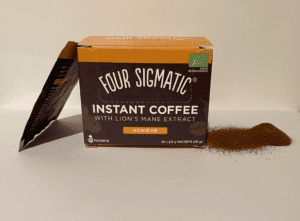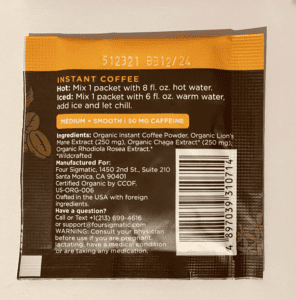Mushroom Coffee: What Is All The Fuss About?

Many coffee manufacturers claim to have the best-tasting, most natural, or most ethically sourced coffee out there. However, with the advancement of biohacking, there are actually now a number of brands that purport a number of health benefits from drinking their coffee as an alternative or substitute.
Coffee alternatives promise to deliver a number of additional health advantages over and above a regular cup of Joe, so you can supercharge your mornings without having to take an expensive cocktail of multivitamins.
Mushroom coffee is one of these coffee alternatives that many people, including the famous comedian and podcaster Joe Rogan, swear by.
In fact, he recommends Four Sigmatic mushroom coffee to his guests all the time! He claims it stimulates conversation, gets the brain firing, and gives him clarity of thought, unlike a regular cup of coffee.
But, with all the hype around mushroom coffee, the question still remains… is it really worth all the fuss?
Well, let’s dig a little deeper and find out!
What is Mushroom Coffee?
The first question that springs to mind when someone mentions mushroom coffee is, does it really contain mushrooms?!
Whilst mushrooms certainly tend to have an earthy flavor, much like coffee, the thought of a coffee connoisseur trading in their much-loved ground Arabica for a cup of fungi sounds absurd!
In fact, mushroom coffee contains mushroom extract (generally used for medicinal purposes) and organic instant coffee. The varieties of mushroom coffee most commonly used are:
- Lion’s Mane
- Chaga
- Turkey’s Tail
- Reishi
- Cordyceps.
These funky names may be a bit alien to you, as they are to me!
So, here is a bit more information on each of the mushroom coffee extract varieties, thanks to Healthline!
Lion’s Mane
One of the most popular mushroom extract varieties is Lion’s Mane. Why on earth is a mushroom named after a Lion you may ask?
Well, Erica Julson is here to help with her Healthline article from May 2018 “9 Health Benefits of Lion’s Mane Mushroom (Plus Side Effects)” which notes that the shape of these mushrooms, being “large and shaggy” represents Lion’s mane.
Julson also goes into the potential health benefits of Lion’s Mane, emphasizing properties such as:
- Relieving anxiety and depression
- Fighting against cancer
- Can help the recovery of the nervous system after a stroke
- Reduces risk of heart disease
- Reduces inflammation in the body.
After plenty of clinical trials, there aren’t any inherent dangers associated with consuming Lion’s Mane mushroom extract. However, those with mushroom intolerances should beware before drinking mushroom coffee, as some people have reported allergic reactions.
Chaga
As per Mary Jane Brown PhD, October 25th, 2018 in “What Are Chaga Mushrooms and Are They Healthy?” via Healthline, Chaga mushrooms have a rich history of offering health benefits such as boosting your immune system, helping to fight against cancer and lowering blood sugar.
Chaga mushrooms have been used for centuries in parts of Siberia, Russia, and Northern Canada. They grow best in colder climates and are generally used for their medicinal qualities.
Whilst Chaga in its own right doesn’t have any major health risks associated with it, the potential drawbacks of using Chaga mushrooms extensively come from the interaction with other medical conditions. For example, someone with diabetes or on blood thinning medication should be wary and consult their doctor before using Chaga regularly.
Turkey’s Tail
Another interestingly named coffee extract is Turkey’s Tail. In her 2018 Healthline article titled “5 Immune-Boosting Benefits of Turkey Tail Mushroom”, Jillian Kubala notes that the “striking colors” of this fungus give it its peculiar name.
She also highlights the commonly known health-boosting components of Turkey’s Tail mushrooms, including:
- Polysaccharopeptides (PSK): Boosts immune health, reduces inflammation, and can improve the effectiveness of cancer treatments
- Antioxidants: Great for reducing oxidative stress
- Coriolus Versicolor Glucan: Known to reduce the growth of tumors
- Prebiotics: Promote better gut health.
Reishi
Another variety of mushroom extract used in mushroom coffee is Reishi. This bright-looking mushroom also has a number of health benefits associated with it, according to Grant Tinsley PhD, via Healthline March 2018 in “6 Benefits of Reishi Mushroom (Plus Side Effects and Dosage)”.
Tinsley highlights that regular consumption of Reishi is associated with:
- Reduced risk of cancer
- Enhanced immune defense
- Improved mood and energy levels
- Regulated blood sugar levels
- Improved heart health.
It is worth noting that an extract of Reishi mushroom is only 10% as potent as the real thing. Also, Tinsley points out that some people experience digestive stress whilst consuming Reishi on a regular basis, so consult a doctor before adding it to your diet.
Cordyceps
Cordyceps are actually a very interesting variety of mushrooms, because of how they grow. In an article titled “6 Benefits of Cordyceps, All Backed by Science” Gavin Van De Walle, May 9, 2018 via Healthline, notes that cordyceps actually feed off the bodies of insect larvae.
This is perhaps the most aggressive and destructive growth method of any of the mushroom extracts mentioned, as cordyceps infect the host’s body and grow stems out of it to form the mushroom that we consume in coffee!
Van De Walle then adds that the “remains of the insect and fungi have been hand-collected, dried and used in Traditional Chinese Medicine for centuries to treat fatigue, sickness, kidney disease, and low sex drive”.
So, these strange-looking fungi do actually have health benefits that make them worth trying out!
Benefits of Drinking Mushroom Coffee
As noted above, the individual varieties of mushroom extracts used in mushroom coffee are pretty amazing in their own right.
However, as per Alexandra Benisek’s article titled “Mushroom Coffee: Are There Health Benefits?”, WebMD May 2021, some of the main health benefits of drinking mushroom coffee in general include:
- Improved sleep
- Reduced stress
- Reduced inflammation.
What’s more, Good Housekeeping highlights the following additional benefits in their July 2021 article “What Is Mushroom Coffee and Does It Have Any Health Benefits?”:
- Supports the immune system
- Helps protect against chronic diseases
- Improves focus
- Can protect against Parkinson’s and Alzheimer’s.
Ingredients and Nutrition of Mushroom Coffee
The main ingredients found in mushroom coffee are mushroom extract and instant coffee. However, the exact ingredients found in the different brands will of course vary.
I gave Four Sigmatic, one of the most popular mushroom coffee brands out there, a try.
The nutritional information and list of ingredients are detailed below:

How Does Mushroom Coffee Taste?

First things first, the smell of mushroom coffee is a little stronger and more abrasive than a regular cup of specialty coffee.
It comes across as quite bitter and could put someone off trying it for the first time.
You can definitely smell the mushroom extract, but it is more nutty and subtle than say a cup of dried porcini!
However, move past this and take a sip and you’ll be greeted with a strong, but palatable cup of coffee with an intriguing aftertaste.
Four Sigmatic mushroom coffee with Lion’s mane extract has a particularly unique taste. It is slightly bitter and has a distinctly nutty, almost umami flavor. For those not familiar with the umami taste, it is actually one of the five major taste groups, along with sweet, sour, salty, and bitter.
Find out more about the savory umami flavor here.
Mushroom coffee is generally served black, but if the bitterness is a little overpowering, you can certainly add a splash of milk, a milk alternative, or a natural sweetener to enhance the flavor.
Four Sigmatic mushroom coffee also only contains around 50 mg of caffeine, so it won’t give you the dreaded caffeine crash in the middle of the day! You’ll get a more balanced focus and energy release, which, alongside the other benefits of a mushroom extract, will keep you focussed throughout a busy morning!
I have to say after trying it myself, I was treated to a few hours of focused work that didn’t give me any anxiety or crash, as I may experience from having a few espressos in the morning!
Who are Four Sigmatic?

As previously mentioned, Four Sigmatic is one of the most well-known mushroom coffee brands on the market today.
As per their About Us page, Four Sigmatic started out in Finland, where mushroom coffee has actually been used for decades. In fact, it was used as a coffee replacement during the second world war when coffee was a scarcely traded commodity.
Four Sigmatic is given its name due to the distribution of the 4th sigma on a nutritional bell curve, denoting the highest quality of nutritional value from a food source.
They mainly use Chaga and Lion’s Mane as their mushroom extracts of choice, as they believe these have the most pronounced health benefits.
The company was founded in 2012 by two Finnish men Tero Isokauppila and Mikko Revonniemi and is currently headquartered in Los Angeles, California USA. It currently turns over around $23m per year and has over 80 employees, as per GrowJo’s “Four Sigmatic Revenue and Competitors” 2022.
Should You Buy Mushroom Coffee?
So, should you go ahead and trade in your morning brew for a cup of mushroom coffee instead?
Well, I wouldn’t say so…
Mushroom coffee does contain regular, organic instant coffee so of course it does taste somewhat similar to your normal morning brew.
However, if you are a coffee lover that enjoys the subtle, multifaceted flavors of high-quality Arabica beans, you may well find the bitterness of mushroom coffee a bit off-putting.
That being said, the potential health benefits of mushroom coffee are undeniable.
So, perhaps the way forward would be to add a cup of mushroom coffee to your morning routine, rather than replace your regular cup of coffee altogether.
There are only 50 mg of caffeine in a cup of Four Sigmatic mushroom coffee, so adding it to your regular cup in the morning is unlikely to have a massive effect on your daily caffeine intake.
Therefore, given how many health benefits are associated with mushroom coffee, I would say it is well worth adding to any coffee lover’s arsenal. However, it may not be the perfect replacement for a good old cup of freshly brewed specialty coffee!
Buy Four Sigmatic Mushroom Coffee on Amazon Here!
Summary
Overall, mushroom coffee does have a number of health benefits that are well worth considering.
There is a lot of hype around mushroom coffee and it is actually one of the few products that stand a chance of living up to it.
As far as taste goes, mushroom coffee is not exactly a direct replacement for regular, freshly brewed coffee. There is a distinct bitterness and umami (savory) flavor that makes mushroom coffee a bit more earthy than the real thing.
That isn’t to say it tastes bad by any means, but it is just a slightly different flavor to your regular cup of joe. Also, it’s nothing a bit of milk or sweetener couldn’t fix!
Aside from the taste, the health benefits associated with mushroom coffee are pretty undeniable!
Whilst there isn’t necessarily a wealth of literature on the subject, there are plenty of studies and anecdotal accounts that champion mushroom coffee for the improvements in focus, reduction of inflammation, and management of anxiety just to name a few.
So, is mushroom coffee really worth it? Well, it may not be your next gourmet, specialty coffee replacement, but it is well worth giving a try and incorporating into a healthy, balanced diet!
Mushroom Coffee Frequently Asked Questions
By all accounts, yes very! It is a healthy alternative to regular coffee due to the reduced caffeine content and a multitude of health-promoting ingredients.
No, there are no hallucinogenic mushrooms found in mushroom coffee.
Some brands of mushroom coffee, like Four Sigmatic, contain a small amount of caffeine, but others do not contain any.
There are not any major health risks associated with mushroom coffee. Some anecdotal accounts of allergic reactions and upset stomach or digestive problems have been reported, but these are generally down to generic mushroom intolerances.
Mushroom coffee contains mushroom extract and in some cases, instant coffee.
Not particularly. You can’t really taste a distinctive mushroom flavor when you drink mushroom coffee, however, it is slightly more bitter and has a more savory flavor than regular coffee.



